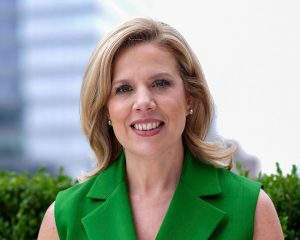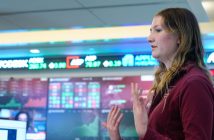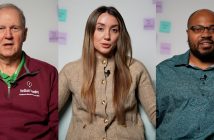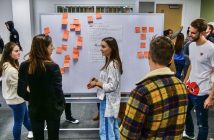Succeeding in business has always required a certain capacity to deal with the unknown, and with unpredictability very much on the horizon for the foreseeable future, business students will need that know-how now more than ever.
Teaching them how to do just that is the focus of The Future of Business Education, a conference being held virtually at the Gabelli School of Business on Oct. 1 at 11 a.m.
Originally planned to take place at Fordham’s London Center campus as a follow up to a March conference on the future of work, the event was moved online in response to the COVID-19 pandemic.
Even in its virtual format, it still retains a fundamentally international perspective. The opening plenary discussion, which will be moderated by Donna Rapaccioli, Ph.D., dean of the Gabelli School, will feature Gerardine Doyle, associate dean & director at UCD Michael Smurfit Graduate Business School in Ireland; Peter Tufano, dean of Oxford University’s Saïd Business School; and Giorgio di Giorgio, deputy rector at Luiss Guido Carli University in Italy.
Lessons in Global Diversity
Meghann L. Drury-Grogan, Ph.D., an associate professor of communication and media management at the Fordham London Centre, said the participants’ insights are especially relevant, given the extreme divisions coursing through American society today.
“Europe has to deal with this idea of diversity of different nationalities, different ethnicities, different languages, different currencies, and different cultures, and sometimes they’ve got it right, and sometimes they haven’t,” she said.
“I do think looking at how they balance [this]diversity … could teach us a lot in the United States.”
Valuable Skills for a Changing Landscape
Keynote speaker Jacqui Canney, global chief people officer at the global advertising firm WPP, said that in fact, the challenges before businesses today should be seen as “catalysts to rethink the way we work and to build an even more inclusive culture.”
“I think we’re realizing that a reckoning is already here, from the global pandemic to the uprising for racial justice to the climate crisis. The uncertainty makes it all the more important for us to accelerate our plans for the future,” she said.
“At WPP we want to focus on a key question: how will our people strategy help us attract and retain the best, diverse, creative talent to achieve our business strategy?”
When it comes to business education, Canney suggested that what’s needed is a hefty dose of empathy, both for students preparing to enter a job market undergoing enormous upheaval and for educators trying to teach in difficult circumstances. Companies have a role to play as well, she said, and when the pandemic disrupted internships in the spring, WPP created the NextGen Leaders virtual learning series. The program was offered to more than 800 students from 310 colleges in 54 countries.
“I spent a lot of time with this group, and I told them we look for employees who develop and build skills of the future: digital literacy, flexibility, a growth mindset, data-driven decision making, and empathy,” she said.
“Above all, we’re looking for people with a sense of purpose, people who will help us foster inclusion. I think educators who can help students find and build that sense of purpose will help their business students beyond measure.”
Continuing to Pivot
Drury-Grogan said a major focus of the conference will, in fact, be to get a sense of what other skills companies are looking for in students in order to help them weather the storms ahead. The second conference panel, for example, will feature Jag Chana, UK marketing leader, of Brand, Marketing & Communications at EMEIA Financial Services, EY, Emanuele Lauro, CEO and director of Scorpio Tankers, Inc., and Jon Norton, managing director, at Crestline Investors.
“Just as we pivoted to online learning in March, I feel like we’re going to have to continue to pivot, because everything’s still changing, on a weekly or even daily basis,” she said.
“So we need to think about how we build flexibility into our curriculum models and how we teach students to be flexible when they’re in work and adjust to uncertainties.”
The conference is free and open to the public. Register here.




